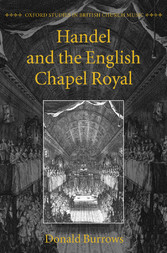
Handel and the English Chapel Royal

von: Donald Burrows
Oxford University Press, 2005
ISBN: 9780198162285
Sprache: Englisch
680 Seiten, Download: 14885 KB
Format: PDF, auch als Online-Lesen
16 The London Choirs (p. 439-440)
The Chapel Royal
The Chapel Royal, the Royal Musicians, and the Royal Trumpeters were all within the Department of State administered by the Lord Chamberlain. The Master of the Musick and the Musicians in Ordinary were among the ‘Servants above Stairs’ under the direct control of the Chamberlain, but the Chapel Royal was a separate sub-department of the Chamber and had a greater measure of independence: the management of the Chapel was the responsibility of the Dean, though (as the Cheque Books show) the Sub-Dean in practice acted for him in most matters of routine administration. There was no parallel Cheque Book for the Royal Musicians: matters such as suspensions and dismissals, which for the Chapel Royal were dealt with internally and recorded in the Cheque Books, are in the case of the Musicians recorded in the general run of government papers for the Lord Chamberlain’s Department. The Musicians, like most Above-Stairs servants, were sworn into their places by the Gentlemen Ushers: Chapel Royal admissions were dealt with by the Sub-Dean, who administered the oath of allegiance and submitted a certi.cate to the Lord Chamberlain. (As noted in Ch. 7, Handel’s appointment as Composer exceptionally followed the first route, rather than the second.) The tenure of Chapel Royal posts appears to have been almost completely free of political interference during the period 1700–50, the only suspicious exception being the departure of the Dean and Sub-Dean under unrecorded circumstances in March 1717/18.3 Chapel Royal Gentlemen could normally expect to retain their places as long as they lived. Working continuously together, the members of the Chapel formed a distinct community: there was a tendency for court service to become a family business and, although this was less prevalent in the Chapel Royal than among the Musicians and the Trumpeters, a certain amount of intermarriage and father–son continuity can be traced. There was no residential accommodation at St James’s Palace for the Gentlemen, though several singers who had dual membership had lodgings in the Little Cloister at Westminster Abbey by virtue of their places in the Abbey choir, and others lived at houses in Westminster that may have been regular residences for members of the choir. For many of the Gentlemen, their daily performing schedules were probably supported by strong personal and marital relationships. In 1740 William Turner and his wife died within a few days of each other at their house in Duke Street, Westminster:6 Turner was 80 years old and had been one of Purcell’s contemporaries at the Chapel. The frequent deaths of children of the Gentlemen that are recorded in the registers of Westminster Abbey and St George’s Chapel, Windsor, are constant reminders of the high level of infant mortality in the eighteenth century, which must have had a disturbing effect: the day-to-day background to the lives of these Gentlemen must have been very different from that of the unmarried men such as Abbot, Hughes, andWeely. No doubt the choirs included a number of men with male orientation, but this does not seem to have affected their professional activity.







